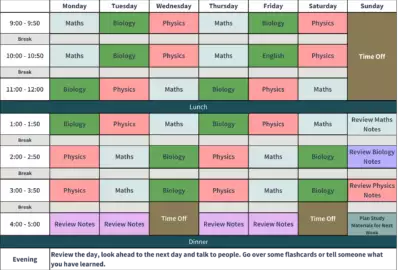Expert Insights
The Ultimate Guide to the Extended Project Qualification (EPQ) - 2025
Published 11th April 2025 by Alastair

EPQ Guide: Everything You Need to Know About the Extended Project Qualification
Choosing to undertake an Extended Project Qualification (EPQ) can be one of the most rewarding decisions a sixth-form student makes.
Whether your goal is to boost your UCAS application, dive deeper into a subject you’re passionate about, or gain valuable independent research skills, the EPQ is a great option, and a unique academic challenge that stands out, both on paper and in practice.
This guide will help students through every step of the EPQ journey. Our tutors, many of whom are Oxbridge graduates and experienced examiners, support learners in developing strong research skills, critical thinking, and academic writing. In this guide, we’ll take you through everything you need to know: from selecting the right topic to achieving top marks.
Let’s begin with the fundamentals...
It’s worth up to 28 UCAS points, roughly equivalent to half an A level, and can take the form of a 5,000-word dissertation or a practical project (such as an artwork, performance or design) accompanied by a shorter written report.
What sets the EPQ apart is the freedom it offers. Students can explore any topic that genuinely interests them, often going beyond the scope of the school curriculum. That might be something related to a future degree or career path, or simply an area they’d like to explore in depth.
More importantly, the EPQ is a chance to demonstrate qualities that universities value highly: intellectual curiosity, initiative, critical thinking and the ability to manage a substantial piece of independent work. It can make a real difference in competitive admissions processes, particularly for courses such as Medicine, Law or Engineering, and often becomes a valuable talking point in personal statements or interviews.
In the next section, we’ll explore who the EPQ is most suited to, and how to decide whether it’s the right choice for you.

The EPQ is not compulsory, which means deciding whether to take it on depends entirely on your interests, capacity and academic goals. For some students, it becomes a highlight of their sixth-form experience. For others, it can be an additional pressure at an already demanding time.
One of the main reasons students choose to do an EPQ is to demonstrate independent thinking and subject-specific enthusiasm. This is particularly useful for those applying to competitive university courses, where admissions tutors are looking for evidence of genuine engagement beyond the classroom. A well-executed EPQ can be an excellent way to show this.
It also allows students to explore an area they may not have had the opportunity to study formally. For example, a student applying for Law might explore the ethical implications of artificial intelligence in criminal justice, while a future Engineering student might choose to design a model of a sustainable transport system.
However, taking on an EPQ requires careful time management. Students will need to plan their project alongside A level studies, university applications and any other commitments. It’s worth being honest about how much time and motivation you have, and whether the project will enhance your overall academic profile without compromising your other results.
Some schools or colleges may encourage all students to take on an EPQ, while others offer it more selectively. If you're unsure, it’s worth discussing your plans with a teacher, academic mentor or one of our advisors at Ivy Education. The EPQ can be a brilliant addition to your sixth-form experience, but like any academic challenge, it’s important to approach it with clarity and commitment.
| EPQ Grade | UCAS Tariff Points |
|---|---|
| A* | 28 points |
| A | 24 points |
| B | 20 points |
| C | 16 points |
| D | 12 points |
| E | 8 points |

As mentioned previously in this guide, one of the most attractive features of the EPQ is the freedom it gives students to choose their own topic. Unlike A level subjects, which follow a set curriculum, the EPQ offers a chance to explore an idea, question or issue that genuinely sparks your interest.
Your chosen subject can link directly to your intended degree or future career, but it does not need to. Some students use the EPQ to demonstrate early engagement with a particular field, while others take the opportunity to investigate something completely different. The key is that it should be something you are willing to commit time to and think about in depth.
There are, however, a few important considerations when selecting your topic. It needs to be focused, clearly defined and researchable. You should be able to investigate it using a range of sources, evaluate those sources critically and come to your own well-reasoned conclusion. Broad or vague subjects tend to be more difficult to manage and often result in lower marks.
For example, a general question such as "What causes climate change?" is too wide in scope. A more effective alternative might be "To what extent does fast fashion contribute to climate change in the UK?" This version is specific, allows for detailed analysis and gives you space to reach a supported judgement.
The subject you choose lays the foundation for the entire project. A thoughtful and well-defined topic makes every stage that follows clearer and more purposeful.
The key factor is relevance. An EPQ that closely relates to the subject you are applying for can help demonstrate a genuine interest in the field, as well as an ability to think and work independently.
For example, a student applying for Medicine might explore an ethical issue in healthcare, while a prospective Engineering applicant could focus on sustainable materials or structural design. In these cases, the EPQ becomes a way of showing early engagement with the subject, which admissions tutors often look upon favourably.
Subjects that require strong analytical or research skills, such as Law, History, Politics or Psychology, also tend to value EPQs that demonstrate those same skills. A well-researched argument, critical use of sources and clear communication of ideas all reflect positively on a student’s academic potential.
That said, the topic alone is not enough. What matters most is how well the project is executed. A thoughtful, rigorous EPQ in an unrelated area may still impress more than a poorly developed one in a directly relevant subject.
Ultimately, a successful EPQ shows a student can think independently, organise their time effectively and reflect critically on their learning. These are qualities that apply across all degree courses.
Now that we have the basics out of the way, let's begin with starting off your EPQ...

It sets the direction of your research and defines the scope of what you will explore. A clear, focused and well-phrased title gives structure to your work and helps examiners understand exactly what you are trying to achieve.
A good title usually takes the form of a question. This encourages analysis rather than simple description and allows you to present a considered conclusion based on your research. The best questions are specific enough to be manageable, but open enough to allow for discussion and evaluation.
For example, a question such as:
"Is social media harmful?"
is too broad and subjective.
A more effective version might be:
"To what extent has the use of social media contributed to the rise in anxiety among teenagers in the UK since the pandemic?"
This version gives you a defined topic, a target group, a clear time frame and space for a balanced argument.
It is also important that your question allows for access to reliable sources. You need to be confident that you can find enough material to explore your topic in depth. At the same time, you should avoid questions that have already been answered in full. Your research does not need to be original in the academic sense, but it should offer your own perspective or interpretation.
Take time to refine your title before beginning your research. A rushed or unclear question can lead to confusion later on, while a well-structured one provides a solid foundation for the entire project.
A clear and logical framework is essential, both for your own organisation and for meeting the assessment criteria. Below is a guide to each of the main sections of a written EPQ, with example content based on the question:
"To what extent has the use of social media contributed to the rise in anxiety among teenagers in the UK since the pandemic?"
The introduction should outline your chosen topic and explain why it matters. This is your opportunity to set the scene for your project, introduce your research question and show that it has real relevance.
Example content:
In recent years, there has been growing concern about the impact of social media on mental health. Since the COVID-19 pandemic, rates of anxiety among teenagers have increased significantly. This project explores the extent to which social media has contributed to this rise. I chose this topic because I have a strong interest in psychology and wanted to understand how online behaviour might affect emotional wellbeing. My aim is to assess the evidence linking social media use with increased anxiety in UK teenagers and to consider whether other factors may also be at play.
You might also want to briefly mention how you plan to approach the research, including the types of sources you expect to use.
This section explains how you carried out your research. You should describe what sources you used, how you selected them, and any problems or limitations you encountered along the way.
Example content:
My research was based primarily on secondary sources, including academic journals, government health statistics, reports from mental health organisations, and news articles. I focused on studies published after 2020 to ensure that the information reflected post-pandemic trends. I also looked at surveys from organisations such as YoungMinds and the NHS. One of the challenges I faced was finding studies that isolated social media as a cause of anxiety, rather than as part of a wider set of influences. In future, I would consider designing my own survey to gather original data.
You can also mention any changes you made to your approach as the project progressed.
5.3This is the core of your project. You should present your evidence in a structured way, analysing the information you've gathered and explaining how it relates to your question. It's helpful to divide the content into themed sections or arguments.
Example content:
I began by examining data on teenage anxiety in the UK from 2020 to 2023. NHS figures showed a marked increase in reported cases, particularly among girls aged 13 to 17. I then looked at how patterns of social media use changed during and after the pandemic. Time spent online increased significantly during lockdowns, and platforms such as Instagram, TikTok and Snapchat saw major growth in teenage users.
I explored several studies that suggest a correlation between high social media use and symptoms of anxiety. For example, research by the University of Bath in 2022 found that teenagers who spent more than three hours per day on social media were more likely to report poor sleep and low self-esteem. However, other studies argued that the relationship is more complex, with factors such as family background and pre-existing mental health conditions also playing a role.
Throughout this section, it is important to link back to your research question and explain how each piece of evidence contributes to your overall argument.
5.4You should also reflect on how convincing your evidence was and whether your findings are definitive.
Example content:
Based on the research I reviewed, it is reasonable to conclude that social media has contributed to the rise in anxiety among UK teenagers since the pandemic. However, it is not the sole cause. Increased academic pressure, reduced social contact during lockdowns and general uncertainty about the future also appear to be significant factors. While social media use may amplify certain anxieties, it can also provide support and connection for some users. My conclusion is that social media plays an important but not exclusive role in the increase in teenage anxiety.
Avoid introducing new evidence in this section. Focus on drawing together what you have already discussed.
This section asks you to reflect on your learning throughout the project. You should discuss what you found difficult, what you would do differently and how your skills have developed.
Example content:
One of the biggest challenges I faced was narrowing down the topic. Early on, I found myself overwhelmed by the amount of information available and struggled to decide which sources to focus on. Over time, I became better at identifying reliable and relevant material, and more confident in organising my thoughts. I also learned how to write more clearly and structure an argument effectively.
If I were to do this project again, I would spend more time planning my research phase and consider including a small questionnaire or interview to bring in a primary research element. Overall, the EPQ has helped me develop skills in independent study, critical analysis and time management, all of which will be useful at university.
Be honest in this section. Thoughtful reflection is rewarded, even when things didn’t go exactly to plan.

The EPQ is designed to give students flexibility, but there are still some important requirements to be aware of. Below are answers to some of the most common questions students ask before they begin.
6.1If you are producing a written report, it should be around 5,000 words. This includes your introduction, analysis, conclusion and evaluation, but does not include the bibliography or appendices. You are allowed to go slightly over or under the word count, but it should remain within a reasonable range. Too short, and you may struggle to explore your topic in sufficient depth. Too long, and the report may lose focus.
If your project involves a practical element. For example, creating a product, event or performance, the written report should be shorter, typically between 1,000 and 1,500 words. In this case, the focus of the written element is to explain your process and decision-making, rather than to present extended research.
Absolutely. Referencing is a key part of the EPQ and forms part of the assessment. You need to show that you understand how to use other people’s ideas responsibly, and that your conclusions are based on reliable evidence. Most students use a simple referencing system such as Harvard or footnotes. As long as it is clear and consistent, either is acceptable. Your bibliography should list every source you used, even if you only referred to it briefly.
You are allowed to write in the first person, particularly in your reflection and evaluation. For example, phrases such as "I decided to focus on..." or "I found this source useful because..." are entirely appropriate. However, the main body of your report should still maintain an academic tone. Avoid overly casual language, and make sure your analysis is objective and supported by evidence.
The AQA exam board recommends around 120 guided learning hours for the entire EPQ. This includes planning, research, writing and presenting. In practice, students usually spread this time over several months. It’s important to manage your time carefully and avoid leaving things until the last few weeks. The EPQ rewards consistent progress and clear documentation of your process.
Submission deadlines vary depending on your school or college, but most students complete the EPQ by the spring or summer of Year 13. Some students begin planning in Year 12 so they have time to complete the research and writing before UCAS deadlines. It is best to confirm the timeline with your supervisor early on, so you can plan your work accordingly.
The EPQ is graded like an A level, with results ranging from A* to E. The final mark is based on how well you meet a set of assessment objectives. These are designed to reward not just the final product, but the entire process; from planning and research to reflection and presentation.
There are four main assessment areas, each carrying equal weight:
This covers how well you organised your time and resources. Did you set clear goals? Did you stick to deadlines? Did you make thoughtful decisions as your project developed? Your supervisor will be looking for evidence of careful planning and independent work.
Example:
You created a detailed timeline at the start and kept track of your progress through regular updates in your production log. When you encountered difficulties finding recent data, you adapted your approach by focusing on case studies instead.
You are expected to show that you can identify relevant sources, evaluate their reliability and use them to support your work. This includes books, articles, data, websites and any other material that informed your thinking.
Example:
You compared government mental health reports with surveys from independent charities, commenting on differences in methodology and how this affected the findings.
This is about the quality of your final piece, whether that’s a written report or a creative outcome. It should be well-structured, clearly written and demonstrate critical thinking. You are also assessed on how well your final product meets the aims you set out at the beginning.
Example:
Your final report offers a balanced argument, draws on a range of evidence and answers the research question with clarity. You structured it logically and supported each point with relevant examples.
This is your opportunity to reflect on what you have learned, what went well and what you would improve. A good evaluation shows maturity and self-awareness. It’s not just about listing mistakes, but about explaining how you responded to challenges.
Example:
You explained how your note-taking method improved over time, and that you learned to prioritise quality over quantity when selecting sources. You also acknowledged that your original question was too broad and showed how you refined it to something more manageable.
Your final grade will be based on a combination of your written report, production log and presentation. All parts count. Even if your final report is strong, weak planning or poor reflection may affect your mark.
High marks are typically awarded to students who show genuine engagement with their topic, thoughtful analysis and a clear understanding of the research process.

The presentation is a required part of the EPQ and plays an important role in the assessment. While it only forms a small part of your overall mark, it gives you the opportunity to demonstrate what you’ve learned, explain your process and reflect on the journey from start to finish.
The presentation should last around ten minutes, followed by a short Q&A session with your supervisor and possibly another member of staff. It does not need to be overly formal, but it should be well structured, clearly delivered and show that you understand your own project in depth.
The key is to explain your project in a way that makes sense to someone who has not read the full report. Focus on the following areas:
What your research question was and why you chose it
How you approached your research and selected your sources
What you found out and how your thinking developed
Any difficulties you encountered and how you responded
What you would do differently if you were starting again
You don’t need to include every detail. The goal is to tell the story of your project, highlighting the most significant points.
Most students use a short slide deck to help guide their presentation. Keep your slides simple and clear. Avoid putting large amounts of text on the screen — bullet points, graphs, key quotes or images are far more effective. Think of your slides as prompts, not a script.
If you are presenting a practical project, this is also your opportunity to showcase your final product or demonstrate how it works.
After your presentation, your supervisor will ask you a few questions. These are not meant to catch you out. They are usually designed to help you reflect more deeply on your choices and explain your reasoning.
You might be asked:
What made you choose this particular topic?
Which source did you find most useful, and why?
Did your thinking change as you went along?
If you had more time, how would you develop the project further?
Answer as clearly and honestly as you can. You are not being tested on memorised content, but on your ability to reflect and respond thoughtfully.
Practise talking through your project in your own words. You do not need to memorise a speech, but being familiar with your structure will help you stay calm and focused. Try presenting to a friend, family member or teacher who can give you constructive feedback.
Remember that your presentation is not just about what you say, but how you say it. Speak clearly, show enthusiasm for your topic and take pride in the work you’ve done.
Our education consultants, who have had years of experts guiding students through their EPQs, are also available to help. Contact Ivy Education if you would like a dedicated EPQ tutor or consultant.
One of the most practical benefits of completing an EPQ is the positive impression it can make on university applications. Admissions tutors often look for evidence of independent thought, academic curiosity and strong study skills. A well-executed EPQ demonstrates all of these.
Yes, the EPQ is worth up to 28 UCAS tariff points. An A* is equivalent to 28 points, an A is worth 24, and so on. This can provide a useful boost to your application, particularly if you are just below the entry requirements for a course.
Some universities may also include the EPQ as part of a reduced offer. For example, a typical offer of AAB at A level might be lowered to ABB if you achieve an A in your EPQ. This is not guaranteed, and it varies between courses and institutions, so it's important to check individual entry requirements carefully.
Absolutely. The EPQ is an excellent topic to include in your personal statement. It gives you something specific and meaningful to write about, and allows you to reflect on skills such as research, time management and critical analysis. If your project relates directly to the subject you are applying for, even better — it shows genuine interest and a willingness to go beyond the standard curriculum.
Example:
A student applying for Psychology might write about how researching the effects of social media on teenage anxiety helped them engage with key theories around behaviour, perception and mental health. This kind of reflection adds real substance to a personal statement.
It often is. Particularly at competitive universities, such as Oxford or Cambridge, interviewers may ask about your EPQ if you mention it in your statement. They may want to explore your reasoning, challenge your conclusions or ask how the project has shaped your thinking.
This is not something to be afraid of. If you have taken your project seriously and are able to speak about it confidently, it can become a strong talking point. Interviewers are not looking for perfect answers, they are looking for engagement, interest and the ability to think clearly under pressure.
Yes, provided you approach it thoughtfully. While an EPQ that directly links to your chosen course can be particularly useful, a well-structured project in any subject still demonstrates important academic skills. It shows that you can manage a long-term project, evaluate information critically and reflect on your own learning — all qualities that are valued at university, regardless of the subject.

The EPQ offers a unique opportunity to take ownership of your learning. It allows you to explore a subject in depth, develop valuable academic and organisational skills, and produce something that reflects your interests and ability. Whether you are planning to apply for a competitive university course or simply want to challenge yourself beyond the classroom, the EPQ can be a deeply rewarding experience.
It is not an easy option. The most successful projects are built on careful planning, critical thinking and consistent effort. But for students who approach it with curiosity and commitment, the EPQ often becomes a highlight of their sixth-form years, a chance to follow a question through from start to finish, and to produce work that is entirely their own.
No matter what topic you choose, the process itself will teach you skills that go far beyond the final grade. And for many, that is where its real value lies.
If you're considering an EPQ and would like expert guidance at any stage — from refining your question to structuring your research or preparing your presentation — our experienced tutors and education consultants are here to help.
At Ivy Education, we work closely with students across a wide range of subjects, offering tailored one-to-one support that builds confidence and brings clarity to the process.
Get in touch to speak with an advisor and find out how we can support your EPQ journey!
No, the EPQ is entirely optional. Some schools encourage it as part of a sixth-form programme, but it is not a required qualification. Whether it’s right for you depends on your interests, workload and academic goals.
The AQA exam board recommends around 120 hours of work in total. This includes research, writing, planning, reflection and preparing your presentation. Most students spread this over several months, usually starting in Year 12 and finishing in Year 13.
Yes, you can choose any topic that interests you, provided it is suitable for academic research and you can access enough sources. Your question must also allow for analysis and evaluation. It should not simply be a descriptive task or a personal opinion piece.
Yes, particularly in reflective sections such as your evaluation. It is fine to use "I" when describing your decisions or learning experience. The main body of your report, however, should maintain a formal and objective tone.
Yes, but it must be supported by evidence. The EPQ rewards independent thinking, so your conclusions should be based on a careful analysis of your sources rather than personal belief alone.
Harvard is commonly used and is the system recommended by most institutions, but you can use any clear and consistent system. The most important thing is that your references are properly formatted and complete, and that you include a full bibliography at the end.
The production log is a formal document that records your planning, decision-making and progress throughout the project. It is marked as part of the final assessment and should be completed carefully. Treat it as an opportunity to show your thinking, not just a checklist.
Yes, the presentation is a compulsory part of the EPQ. It usually lasts around ten minutes, followed by a short question and answer session. You’ll be assessed on your ability to explain your project clearly and reflect on what you’ve learned.
It can. Some universities may give reduced offers to students with a strong EPQ grade. Others may not lower their offer but will still look favourably on your EPQ as evidence of academic engagement. It can also strengthen your personal statement and provide material for interview discussion.
Yes. You can choose a completely different topic if you wish. Many students enjoy using the EPQ to study something they care about but do not have the chance to pursue in the classroom. Just make sure it’s academically suitable and manageable.
Yes, you can produce an artefact or practical piece, such as a short film, piece of art, engineering design, or musical performance. You will still need to submit a written report explaining the planning, development and evaluation of your work. The report is typically around 1,000 to 1,500 words.
It’s not uncommon to refine or adjust your topic as your research develops. You should record these changes in your production log and explain your reasons. As long as your final question is clear and the project is well executed, a change of direction will not be penalised.
A good EPQ question should be specific enough to answer within the word limit, but broad enough to allow for discussion. If you find yourself listing facts without making a clear argument, your question may be too wide. If you're struggling to find enough material, it may be too narrow. A useful test is whether your question can be answered with a well-supported conclusion.




















